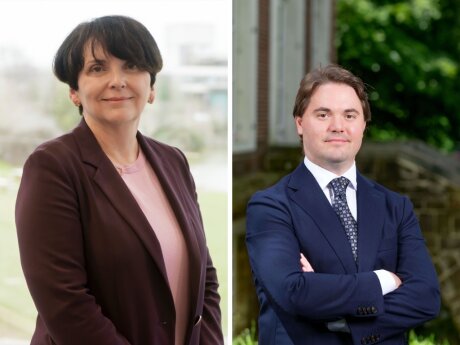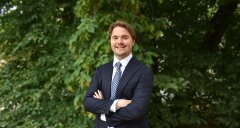Cesaer annual meeting: "Reflecting on the pivotal moment Europe is experiencing" (Orla Feely)
"We gathered for our annual general meeting around several major themes. One of the most pressing was reflecting on the pivotal moment Europe is experiencing. The changes we are seeing could have lasting implications, and we must ensure Europe’s success for decades to come through a strong research and innovation system", says Orla Feely, President of Cesaer
Conference of European Schools for Advanced Engineering Education and Research
on 20/11/2024.
In an interview with News Tank, the woman who is also President of University College Dublin talks about Cesar Annual Meetings 2024, which took place from 16 to 18/10/2024 at the University of Strathclyde (UK
United Kingdom
).
Mattias Björnmalm
![]() Secretary General @ Cesaer
Secretary General @ Cesaer
, Secretary General of Cesaer, mentions a key development that he has been observing over the last few months and which has been highlighted by many of the leaders at the events:
"Different initiatives are beginning to converge. We have seen the Letta report, the Draghi report, the Europe’s Choice guidelines of Ursula von der Leyen, and the Heitor report. Together, they provide a narrative on Europe's positioning relative to global partners and competitors.
There is a newfound sense of urgency and impetus to act at the European level. We were pleased to see Ursula von der Leyen emphasise putting research, innovation, science, and technology at the heart of European efforts, aligning with what Cesaer and its members have long advocated".
Rooted in advanced engineering education and research, Cesaer is an international association of more than 50 leading specialised and comprehensive universities across Europe with a strong science and technology profile that advocate, learn from each other and inspire debates.
A need for a "brutal political fight" (Manuel Heitor)
Cesaer met a day after the Heitor report was released. Manuel Heitor, a long-time member deeply engaged with Cesaer through his work at IST in Lisbon, joined them to discuss his report's recommendations: "His presence sparked a deep and, at times, provocative conversation about the report's implications", Orla Feely says.
"His language resonated with many of us when he described the need for a 'brutal political fight' to secure the future of research and innovation in Europe—particularly the funding and commitment required. This strong phrasing underscored the high stakes at play.
We have said, following the Draghi report, that a robust research and innovation system is essential for protecting Europe's welfare, environment, and society. So, it is vital for those of us who care deeply about these matters to be strong advocates, engaging actively at this crucial time for Europe’s future in research and innovation".
Universities are fully aware and able to communicate with their member state
According to Orla Feely, one of Cesaer's priorities regarding the report is to ensure that "our universities are fully aware of the recommendations and can communicate these within their national contexts, as part of the follow-up now still depends on the engagement of the member states".
In Brussels, the organisation aims to actively engage with key stakeholders on site to "drive forward the Heitor report's implementation.
This involves detailed discussions with the incoming Commission, DG RTD Directorate-General responsible for EU policy on research, science and innovation , and the European Parliament, among others. We aim to reinforce important messages on Europe’s commitment to the next Framework Programme, the necessary funding envelope, and the required structures for implementation. We will be working hard to bring these messages into national and European dialogues".
"The immediate next step is ensuring we maintain momentum", adds the Secretary-General.
"Manuel Heitor recent editorial on our website emphasised the need for Cesaer to collaborate with other major organisations, such as the European Roundtable for Industry, BusinessEurope, Science Europe, the Guild, and others to make our collective voice heard.
We cannot afford divisions or complacency, as there will be other groups, some with greater resources, pushing different priorities.
For us, this advocacy work—building on the momentum from Heitor, Letta, Draghi, and von der Leyen’s leadership—is crucial to keep advancing our shared goals and ensuring robust support for research and innovation across Europe".
How can universities contribute to the evolving European landscape
Among the changes underway at the European level, which were discussed during the events organised by Cesaer at the University of Strathclyde, Orla Feely lists the following:
- "The next Framework Programme for Research and Innovation (FP10 The next Framework Programme for Research, currently referred to as FP10 ) is a topic that is receiving a lot of attention right now;
- the broader and related question of industrial competitiveness, which is increasingly prominent in Europe, with our members having much to contribute".
"The focus on European industrial competitiveness presents a significant opportunity for fresh ideas and ambition around European innovation and research. Many attendees were grappling with how their universities can best contribute to this evolving European landscape", she adds.
"The convergence of political acknowledgement and ongoing developments, such as the European Competitiveness Fund, was a major discussion point, especially in our conversations with Manuel Heitor and invited leaders. Only by working together as a continent can Europe lead globally in science, technology, and innovation", states Mattias Björnmalm.
Asked whether any new topics had emerged during the discussions, the president says that "while the emphasis on industrial competitiveness is not new—we are universities of science and technology and have long worked with industry—the intensity of the current discussion is noteworthy.
In Brussels and within Cesaer, there is a sense of urgency around this topic. Manuel Heitor's mention of a 'brutal political fight' underscores how rapidly things are changing. This pace and magnitude of transformation feel unprecedented, and it has shaped much of our discussion and strategy. We are reflecting on how we, as an organisation, can best support European ambitions and contribute to European success as these changes unfold".
Exploring the concept of "fourth-generation universities"
Orla Feely adds that "a specific and fairly detailed session was dedicated to innovation districts. Since we held the event at the University of Strathclyde in Glasgow—a member with a strong emphasis on innovation in both the city and its surrounding region—they had valuable insights to share.
Other attendees, including Cesaer members, contributed significantly to the discussion on how universities play crucial roles within these innovation districts".
The session brought together the President of the European Innovation Council, Michiel Scheffer, and Martin Kern, the Director of the European Institute of Innovation and Technology (EIT European Institute of Innovation and Technology ). They presented how EU European Union bodies such as the EIC European innovation council and EIT can more effectively support advancements in these areas.
"We had valuable conversations about the diverse forms of innovation districts, their scope, and the types of collaborations they foster. For example, should these districts focus on specific technology domains or be more cross-disciplinary? How large should their spheres of influence be: strictly regional or on a wider scale? We also explored potential new structures for deeper collaboration between universities and industry. It was a truly engaging discussion, with many significant contributions from those present", indicates Orla Feely.
The president of the association presents a project Cesaer is involved in with Elsevier. It's about exploring the concept of "fourth-generation universities" (i.e. institutions actively participating in regional innovation ecosystems).
Speakers
Speakers included, among many others, Michiel Scheffer, Martin Kern, and Signe Ratso, Deputy Director-General at DGRTD of the European Commission, via a video address.
For Mattias Björnmalm, "these individuals represent a range of leaders who play a critical role in linking what we call the research and innovation continuum. This spans from fundamental research to applied scale-ups, deep-tech startups, and various industry collaborations".
"Our members in Cesaer are uniquely positioned to operate across this continuum—from fundamental research to engaging closely with industry, many host companies on their campuses and work alongside industry researchers.
This breadth of engagement places our members and our organisation in an excellent position to explore and influence important themes currently on the European Commission and European Union agenda, such as competitiveness, industry partnerships, and the integration of R&D Research and development with talent development".
"We always discuss education at all our meetings"
When asked about the role of education in this debate, Orla Feely states that they always discuss education at all their meetings. The European university alliances are of particular interest to them, as the association worked closely with the European Commission and its education department (DG EAC Directorate-General responsible for the EU Commission's policies on education, youth, sport and culture ) to help lay the foundation for this initiative back in 2017 and 2018 when the pilot actions were launched under Erasmus.
They also continue to work to ensure the alliances can continue to act as laboratories for success stories.
They also discussed the risk of brain drain from Europe and the need to position Europe as a prime destination for talent, where the education system plays a crucial role. They identified specific skill gaps in Europe and discussed how the education system can respond to these needs.
Additionally, the representatives from the task forces of Cesear were there to talk about the exploration of the engineer of the future. For example, the task force on innovation published its report on PhD cooperation with industry.
"This report examines how PhD candidates across European universities engage with non-academic partners in various ways. This area is a priority for the European Commission and others who see it as a competitive advantage for Europe.
We are fortunate to have excellent universities across the continent, including the United Kingdom, Switzerland, and Norway, and we take a continent-wide approach to strengthening these connections.
By building strong collaborations between academia and industry, we aim to maximise this competitive edge. The report outlined key recommendations that stemmed from this important work".
Report on PhD cooperation with industry
The report
PDF - 1,72 Mo
addresses recommendations to various stakeholders:
• University leaders: "Enhance partnerships with industry to create more industrial doctorate opportunities and improve career pathways for PhD candidates".
• Industry partners: "Provide greater financial and practical support for industrial doctorate programs and collaborate with universities to tailor research training to industry needs".
• Policymakers: "Create supportive policies and funding mechanisms to strengthen industrial doctorate programmes and foster innovation across sectors".
• EU institutions: "Expand funding for industrial doctorate initiatives through programs like Horizon Europe and Marie Skłodowska-Curie Actions, while streamlining regulations for easier collaboration between academia and industry".
Career
Secretary General
Invited Member, Science/Technology & Policy, WEF Expert Network
Deputy Secretary General
Senior Advisor for Research & Innovation
Advisor for R&I
Editor, Science & Policy
Vice-Chair, Policy
Research Fellow
Studies & Diploma
Marie Skłodowska-Curie Individual Fellowship, Bioengineering and Biomedical EngineeringMarie Skłodowska-Curie Individual Fellowship, Bioengineering and Biomedical Engineering
Doctor of Philosophy (Ph.D.), Chemical and Biomolecular Engineering
Master of Science in Engineering Nanoscience
# 51699, created on 03/06/24 at 19:03 - Updated on 05/09/25 at 17:59


